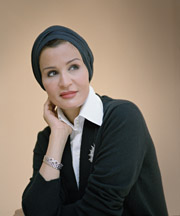Emanzipation in der islamischen Welt findet zwischen diesen beiden Polen statt: Sheika Mozah, die Frau des Emirs von Qatar, äußert sich gegenüber Time Magazine in sehr klaren Worten über Rückständigkeit und Refrom. Sie steht für eine Emanzipation der Oberschicht, die nicht um den Preis der Distanzierung vom Islam erkauft werden soll (wie es bei früheren Oberschichten-Modernisierungen (Schah, Atatürk) der Fall war).

Sheikha Mozah
Und am anderen Ende der Skala eines „islamischen Feminismus“ steht Malika El-Aroud, eine Belgierin marokkanischer Abstammmung, die sich zu einer der Hauptprotagonistinnen des Internet-Dschihad entwickelt hat. Ihr erster Mann war an dem Mord an dem Taliban-Gegner Achmed Schah Massud beteiligt. Sie macht im Web Propaganda für Al-Kaida. Sie tritt selbstbewußt für das Recht der Frau ein, gleichberechtigt am Dschihad teilzunehmen. Wie eine islamistische Calamity Jane treibt sie die Männer mit ihrem Radikalismus und ihrem Blutdurst vor sich her.
Sie wurde von den Belgiern aus Afghanistan herausgeholt, nachdem ihr Mann den Mord an Massud begangen hatte. Erst spielte sie den Behörden vor, sie würde mit ihnen kooperieren, doch nun setzt sie als belgische Bürgerin ihre Hetze fort. Offenbar sehen die Belgier keine Möglichkeit, sie zu stoppen. Unfaßbar.
Dies sagt Sheika Mozah:
Frage: Do you agree with critics who blame Islam for holding women back?
The gender gap is not due to Islam. In the golden age of Islam, women were participating in every aspect of their societies. Look at the men. They are also oppressed. This is the problem: politics, the political agendas that some people are using to suppress their citizens, and traditions that existed even before Islam. Those traditions can play to the interests of some politicians.
Frage: How serious is the gender gap?
It is serious as part of the huge scale of human violation that is taking place today in this part of the world. People will burst someday. People can see what’s going on in the world. They want the same quality of life that other people are enjoying when it comes to freedom and enjoying rights and expressing opinions.
Frage: In talking about political oppression you’re using unusually tough language.
We have to be serious about our problems and shortfalls. It’s time to have self-reflection and self-criticism if we are really genuine about our reforms and if we want to make a historical change.“
Und dies ist die Geschichte von Malika El-Aroud, wie sie in der Herald Tribune erzählt wird:
Born in Morocco, raised from a young age in Belgium, El Aroud did not seem destined for the jihad.
Growing up, she rebelled against her Muslim upbringing, she wrote in a memoir. Her first marriage, at 18, was unhappy and brief; she later bore a daughter out of wedlock.
She was unable to read Arabic, but her discovery of the Koran in French led her to embrace a strict version of Islam and eventually to marry Abdessatar Dahmane, a Tunisian loyal to Osama bin Laden.
Eager to be a battlefield warrior, she hoped to fight alongside her husband in Chechnya. But the Chechens „wanted experienced men, super-well trained,“ she said. „They wanted women even less.“ In 2001, she followed her husband to Afghanistan. As he trained at a Qaeda camp, she was installed in a camp for foreign women in Jalalabad.
For her, the Taliban were a model Islamic government; reports of their mistreatment of women were untrue. „Women didn’t have problems under the Taliban,“ she insisted. „They had security.“
Her only rebellion was against the burka, the restrictive garment the Taliban forced on women, which she called „a plastic bag.“ As a foreigner, she was allowed to wear a long black veil instead.
Die neue Rolle solcher junger Frauen in der islamistischen Terror-Szene, schreibt Souad Mekhennet in ihrem packenden Artikel, habe sehr viel mit der westlichen Idee von Emanzipation zu tun: „The changing role of women in the movement is particularly apparent in Western countries, where Muslim women have been educated to demand their rights and Muslim men are more accustomed to treating them as equals.“
Hier El-Arouds Website, auf der sie als Oum Obeyda auftritt.
